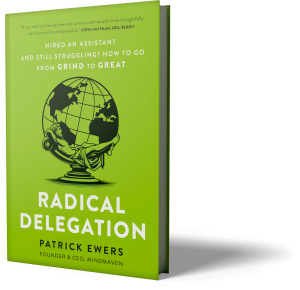
Each month the folks at Weave cohost a monthly live series with Contactually and PersistIQ that covers interesting technology and startup-related topics, as well as interviews with forward-thinking entrepreneurs. In this discussion, Jeffrey Ouyang, who heads up Marketing and Partnerships at Weave, spoke with Patrick Ewers, Founder and CEO of Mindmaven, about the early days of LinkedIn and how his experiences ultimately led him to the creation of Mindmaven.
Sooner or Later You End Up in Silicon Valley
One thing many people don’t know is that Patrick was actually born in Texas. He’s very proud of this fact. However, it was Germany where he grew up and admits he got his entrepreneurial bug. His feeling is that if you’re serious about being a founder or an entrepreneur, you eventually end up in the Silicon Valley, and that’s exactly how he got there. Like many others who arrive, he built his own startup which ultimately didn’t work out. However, he gained a lot of respect and stayed in San Francisco because he fell in love with the people there. It wasn’t long after this that LinkedIn came along, and he realized his next great opportunity.
As the Director for Lead Generation and LinkedIn for Groups, Patrick remembers those days when privacy was a much larger issue. However, the founding team of LinkedIn had a really great strategy. As Patrick relates, “They kicked it off with the most important people they knew.” They invited their friends to join the platform with the theory that 8 people will know another 8 people, and this was a huge win when recruiting their team.
How can your network bring you the opportunities you’re looking for? Tweet this
The idea Patrick took away from this is the absolute need to focus on the people in your network who bring the kinds of opportunities you’re looking for. This also became the basis for his belief that both personal and professional relationships require constant nurturing.
What is NRM, and How is it Different From CRM?
Enter now Mindmaven, Patrick Ewers’ currently successful executive coaching firm. For those who are unfamiliar with his work, Patrick and his team help people connect by finding new opportunities in their network they wouldn’t have otherwise seen.
Most of Patrick’s clients consider themselves relationship-based businesses where 80-90% of their new business comes in the form of referrals. Patrick’s team works with recruiters, consultants, venture capitalists, and startup CEOs who want to harvest serendipity.
The way they do this is with something called NRM or “Network Relationship Management.” Many people have heard of Customer Relationship Management (CRM), but they’re not quite sure how NRM is different.
“What makes CRM unique,” Patrick states, “is that CRMs are built for helping managers understand how their sales teams are performing. The problem is they don’t enable the individual so well. NRM is more personal. It’s about you and your existing network and how you’re going to leverage it to be successful in whatever role you’re in – be it a lawyer who’s running his own desk of clients or a VP of Marketing who’s trying to scale.”
NRM is about leveraging your existing network to be successful in whatever role you’re in! Tweet this
Start Some New Habits
If you’re a professional looking to improve your network with a few simple steps, take a look at this free ebook called the Top 5 NRM Tips. When you sign up on the Mindmaven website, you can get it delivered within minutes. These tremendously helpful habits are the same ones Patrick uses to help his clients and are briefly listed here, but make sure you download the ebook to get all the details:
- Enhance your online profile.
- Learn more about the people you’re meeting.
- Interact with your network at regular intervals.
- Focus on the most important people.
- Send one email a day to someone who wouldn’t have received one.
The best way to look at NRM is it’s working on yourself – it’s changing behaviors, changing habits. Many people know they should be doing this, but they lack a structure to do it. The more often you touch people, the more likely it is that something valuable will come out it. It could be small opportunities, or it could be multimillion dollar deals.
When you focus on NRM, you’re changing behaviors, changing habits! Tweet this
A final piece of advice Patrick offers: “If you’re running a startup, you need to touch the people who can help you get an anchor client, or perhaps a powerful brand-reinforcing video in place. Maybe they know of some great talent.” NRM is such a powerful tool you can use both personally and professionally. If you know what you want and act consistently in a way that increases your chance for opportunity, within a year you’ll see the results!
Want to expand your professional network? Check out the Weave app or Weave Concierge. Weave Concierge is networking on autopilot, and you can learn more by going to concierge.weave.in.
Patrick can be followed on Twitter @PatrickEwers. If you’d like to learn more about NRM, he’d love to hear from you at [email protected].
Image: freestockphotos.com[/fusion_builder_column][/fusion_builder_row][/fusion_builder_container]


